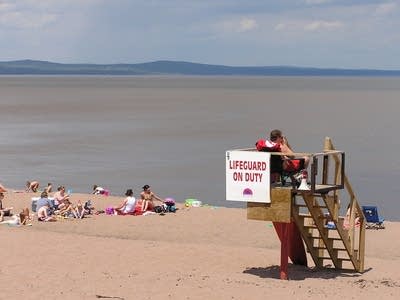Volunteers taking on Duluth city services
Go Deeper.
Create an account or log in to save stories.
Like this?
Thanks for liking this story! We have added it to a list of your favorite stories.

As Duluth struggles to provide city services under ever-tighter budgets, volunteers and nonprofits are picking up the slack.
Last year the city cut 165 full and part time jobs, including summer seasonal workers. Parks, recreation and libraries were particularly hard hit.

The beach at Park Point used to be staffed with city-employed life guards, but they were among more than 100 part-time or seasonal employees cut late last summer. This year, the lifeguards are paid by the YMCA. The YMCA's Mark Hanna hopes it's not a budget buster.
"This is more work for us," Hanna says. "This is more risk for us, but it's a need in the community and the YMCA is stepping up to the plate."
Turn Up Your Support
MPR News helps you turn down the noise and build shared understanding. Turn up your support for this public resource and keep trusted journalism accessible to all.
The Y also manages some city ball fields, getting free use for YMCA programs while collecting rental fees from other organizations to offset its costs. If things work out, the organization will break even.
The YMCA has also taken over one of the city's 25 neighborhood community centers.
"The Woodland Community Center is a building; a nice building that the city has used for years and years, and with the city budget cuts, it was just going to be locked up," Hanna says.
Relying on volunteers is not sustainable. This is just a short term solution to see this community through this very hard time.
Hanna predicts a long-term commitment.
"I suspect that the working relationship will be permanent," Hanna says. "The life-guarding the city may take over one day; or Woodland Community Center the city may take over one day. I think the city and the YMCA and other organizations will continue to work together to meet the needs of the community."
For many Duluth programs and projects, volunteers are saving the day, according to Kathy Bergen, who directs the city's Park and Recreation Department.
"The volunteers that have come forward have been fantastic," Bergen says. "We're almost overwhelmed by the public interest and concern and desire to help us."
However, the long term is anyone's guess. "I really wish I had a crystal ball, and I don't," Bergen says.
The long-term outlook doesn't look good. On Tuesday, Governor Pawlenty proposed cuts to Local Government Aid - $1.5 million from Duluth's allocation this year, and $3.5 million next year.

That means the group of volunteers which has taken over popular winter ski slopes in Duluth's Chester Bowl Park will be doing so again next winter. Thom Storm of the Chester Bowl Improvement Club says his group is asking parents for $10 a day per kid in the organization's summer recreation program.
"We've specifically made it a suggested donation, so if people can't afford that, they don't have to," Storm says. "You know, we're hoping some people will pay it, because we have to pay the counselors some money to work here."
Four counselors are hired for a nine week summer session. There are parent volunteers, and a couple from the federally funded AmeriCorps program.
Storm says it's important. The community programs are more than recreation for the kids.

"Over the years I've had a lot of kids come back to me and say, 'boy if it wasn't for Chester Bowl, I would have, you know, taken a different path,'" says Storm.
However, there's a problem with success. There's some question about the long term enthusiasm among volunteers.
"Relying on volunteers is not sustainable," says Chester Bowl area parent Barbara Weinstein. "This is just a short-term solution to see this community through this very hard time."
Weinstein says registrations for the club's summer program are way below last year, when the city ran the program. About 50 kids have signed up so far, compared to 133 last summer.
Storm worries the club's efforts may not be temporary.
"My speculation is, if what we're doing at Chester Bowl is successful, that there isn't much motivation for the city to come back and say, 'you know, now we've got some money and we'll fund this again,'" he said. "The financial climate we're in now - the state aid to cities which keeps getting cut more and more - I really don't see this turning around."



